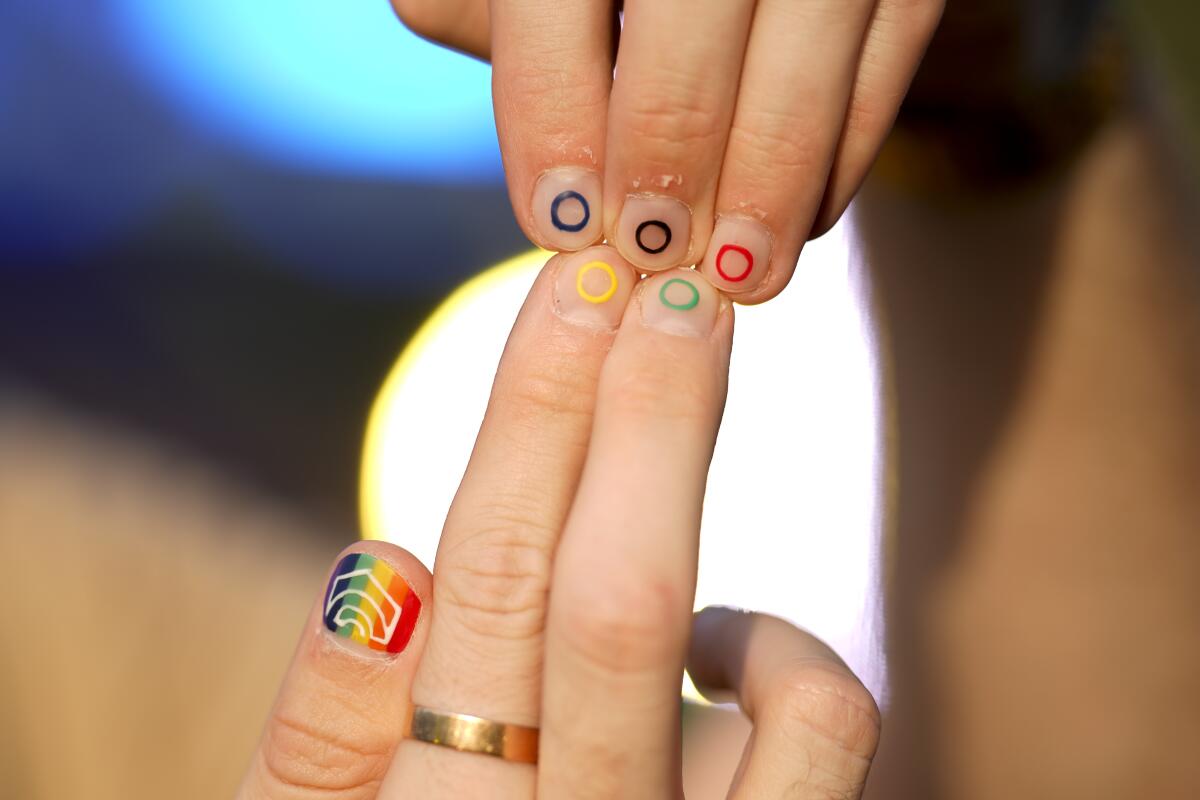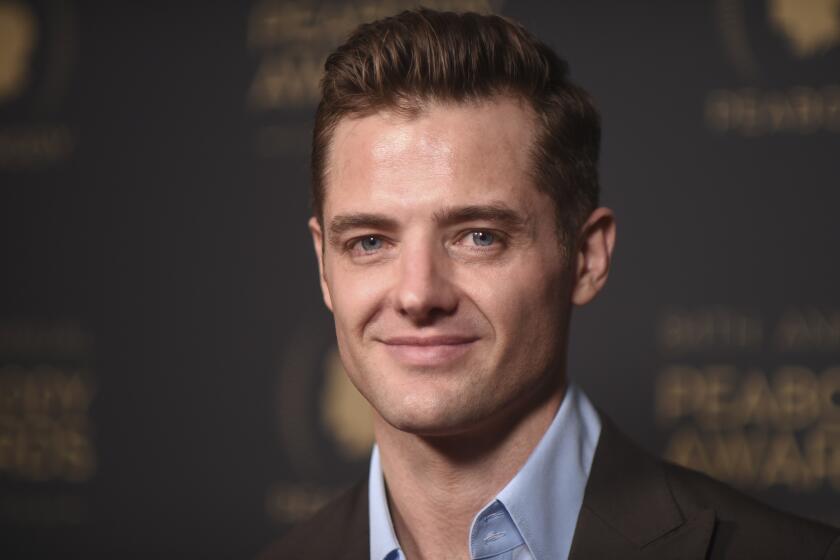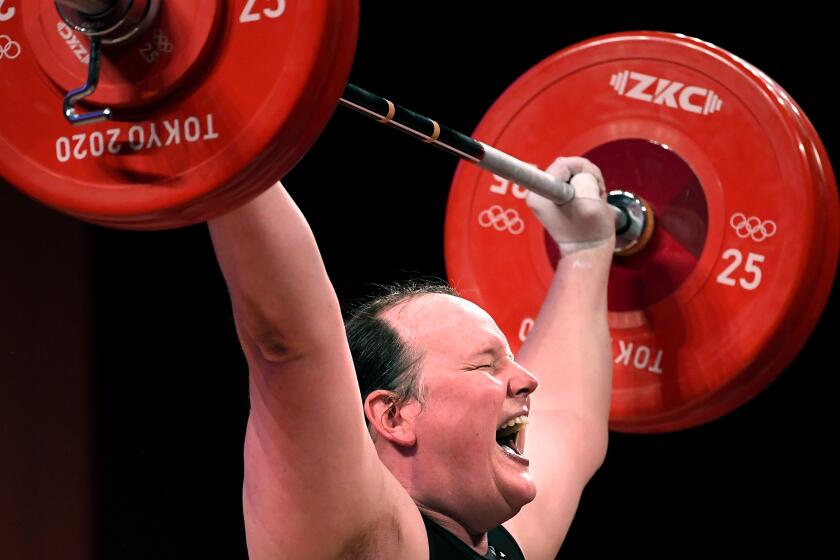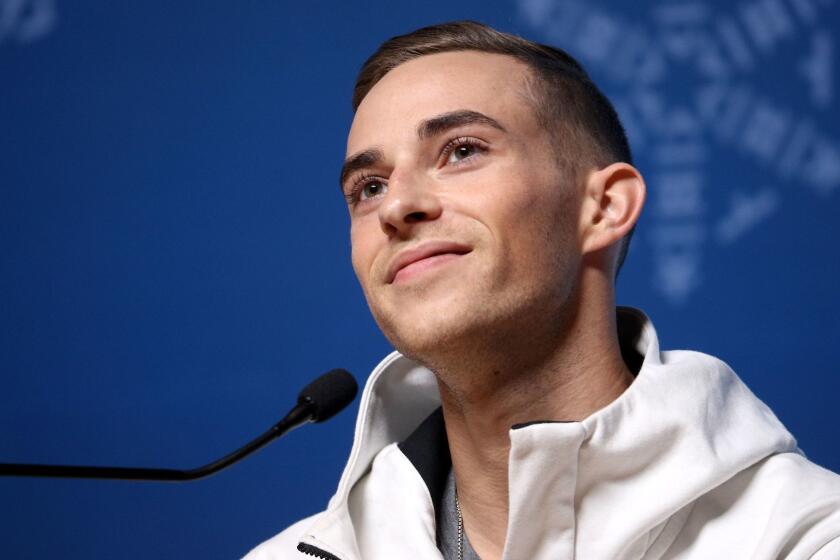Paris Olympics set record for number of openly LGBTQ+ athletes

- Share via
PARIS — When Charline Van Snick flirted with another female athlete after winning the bronze medal in judo in the 2012 London Olympic Games, she said her coach told her she needed to stay in the closet for the future of her career.
“It was a moment when I didn’t feel like myself,” the 33-year-old retired Belgian Olympian said. “He said, ‘Charline, you have to fit in the box. Everyone is looking at you and you have to be straight.’
“I understood that it’s not a place to be yourself,” Van Snick added. “It’s not a place to be LGBTQ+.”
While the Olympic Games have made giant strides in the years since — the 2024 Paris Olympics set a record for the most athletes who are openly LGBTQ+ — advocates and athletes say international athletics have a long way to go in opening up to the queer community.
There has been outcry from religious groups and others to Friday’s opening ceremony that showcased DJ and producer Barbara Butch — an LGBTQ+ icon — flanked by drag artists and dancers in a scene that critics interpreted as mocking Leonardo da Vinci’s “The Last Supper.” Butch says her lawyer is filing complaints over threats and other abuse she has faced online since the show.
The rights of LGBTQ+ students will be protected by federal law under new Title IX rules, but transgender athletes are not mentioned in the safeguards.
During the ceremony, International Olympic Committee President Thomas Bach sent a message in his speech: “In our Olympic world, we all belong.”
Parisian officials kept up their push for inclusion Monday night, opening the Olympic Pride House on a boat on the Seine River. France’s sports minister, Amelie Oudea-Castera, told the Associated Press that “a message of inclusion” is intentionally being sent in these Games.
“It’s important to Paris, to keep fighting against all types of discrimination,” Oudea-Castera said. “We need to drive this progress in society, and the reason I am here today is because sport is a very powerful agent to do that.”
The Paris Olympics broke a record by having 193 openly LGBTQ+ athletes competing, according to Outsports, a website that has compiled a database of openly queer Olympians. The count surpassed the 186 athletes at the COVID-19-delayed Tokyo Olympics in 2021.
Olympic officials’ messages and the record have been welcomed by many in the LGBTQ+ community.
Matt Clark, 31, who was among those celebrating the inauguration of the Pride House on Monday, said Paris had “started a legacy that is going to continue in other Games.”
While it might seem as though the acceptance of gay athletes never evolved, former Galaxy star Robbie Rogers has become a family man and pioneer in entertainment.
“It is going to continue with other athletes and young people everywhere that it is OK to be gay and it is OK to be queer and you have a future in front of you,” he said. “Five, 10 years ago, you had coaches telling their athletes, ‘Don’t come out; it will ruin your career.’ Now it has become a springboard for people’s careers.”
Clark cited British diver Tom Daley’s rise to celebrity as an example.
Van Snick, the 2012 Belgian judo medalist, said it took her a long time and stepping out of the spotlight to become truly comfortable with her own sexuality.
She noted the debate over LGBTQ+ inclusion in Olympic events was ongoing, and said she was disappointed by cases in which transgender athletes have been excluded.
Laurel Hubbard, New Zealand weightlifter, is among the first openly transgender athletes to compete at the Olympics.
“The world has grown since I was an Olympic medalist,” Van Snick said. “But when I think of the trans question, we have a long way to go.”
Still, LGBTQ+ advocates see the Paris Games as an opportunity, especially for athletes from countries that harshly restrict queer populations.
“Coming to Paris, coming to France, they are able to be their true selves,” said Jeremy Goupille, co-chair of the Pride House, which debuted at Vancouver’s 2010 Winter Games as a hub for queer participants.
He said security concerns remain for many athletes. Dating apps such as Grindr, Bumble and Tinder have long been used as a shield for those who want to connect with other queer people at competitions without feeling publicly exposed.
But Goupille said some people have been known to check the heights, weights and locations of those using such dating apps during previous Games in an effort to expose athletes who are not officially out.
The first openly gay male athlete at a Winter Olympics was British figure skater John Curry, in 1976.
For that reason, Grindr announced that it was disabling location-based features in Paris within the Olympic village where athletes stay and other official Games areas, so that LGBTQ+ athletes can connect “authentically without worrying about prying eyes or unwanted attention.”
The app did the same during the 2022 Beijing Olympics.
“If an athlete is not out or comes from a country where being LGBTQ+ is dangerous or illegal, using Grindr can put them at risk of being outed by curious individuals who may try to identify and expose them,” Grindr said in a statement.
But there were complaints on social media last week that some users had problems accessing the app in the Olympic village.
“You have to protect them because so many bad people exist. At the same time, there are so many beautiful athletes,” Goupille said. “They want to meet someone and it’s difficult.”
Janetsky writes for the Associated Press.
More to Read
Sign up for Essential California
The most important California stories and recommendations in your inbox every morning.
You may occasionally receive promotional content from the Los Angeles Times.














